Florida expands addiction recovery program, which was modeled on one in Palm Beach County
- Oops!Something went wrong.Please try again later.
Florida Gov. Ron DeSantis expanded the state's addiction recovery program, one modeled on a program in Palm Beach County.
DeSantis also signed two bills that, along with the expansion of the Coordinated Opioid Recovery (CORE) Network, would bolster the state's fight against the overdose crisis, he said Monday at a lectern in Seminole County, behind a sign that read "Fighting Fentanyl."
The CORE recovery program is modeled on a program in Palm Beach County, which, among other efforts, created a hospital unit, especially for patients who have overdosed. Unlike other ERs, patients are hooked up with needed services such as housing and are urged to go into treatment. The Addiction Stabilization Unit at JFK North Hospital in West Palm Beach also helps patients with medication-assisted treatment — drugs like Suboxone — that help sustain recovery.
Florida Shuffle: State's failure to oversee addiction treatment leaves patients in deadly danger
More: Help coming on addiction treatment centers

One of the bills DeSantis signed Monday deals with first responders being exposed to fentanyl. He said the bill (SB 718) would "make sure that the people that wear the uniform are protected." State Surgeon General Joseph Ladapo and Department of Children and Families Secretary Shevaun Harris joined DeSantis at the press conference.
"If an officer says 'Do you have drugs in your possession,' and you lie, and then the officer ends up getting exposed and harmed, we're gonna throw the book at you, and we're gonna hold you accountable," DeSantis said.
According to national medical experts, however, first responders being exposed to fentanyl isn't a problem that needs legislation. Instead, they say, this law would create an “unnecessary concern."
“National bodies of experts have thoroughly assessed the risk of exposure to fentanyl during emergency response and have determined it to be extremely low,” wrote Dr. José G. Cabañas, president of the National Association of EMS Physicians, in an email to USA TODAY Network-Florida in January.
“It is essential to recognize that such a policy could also potentially discourage bystanders or family members from reaching out for emergency assistance during an overdose,” he added.
DeSantis also signed another bill (SB 66), also known as "Victoria's Law," which establishes June 6 as a day for the Florida Department of Health "to raise awareness of the dangers of opioid overdose and the availability and safe use of opioid antagonists as an effective way to rapidly reverse the effects of opioid overdose."
Victoria Siegel, the daughter of reality TV star Jackie Siegel, who also starred in 2012's "The Queen of Versailles," died at 18 from an overdose in 2015.
The CORE Network is an effort between the state's Department of Health, Department of Children and Families and the Agency for Health Care Administration. Its aim is to curb the number of deaths caused by the polluted drug supply and will be expanded to 29 counties.
The program, which started in 12 counties in 2022, connects people with medication treatment, recovery programs and peer support.
Counties that will now have CORE clinics are: St. Lucie, Broward, Miami-Dade, Indian River, Brevard, Clay, Escambia, Gulf, Marion, Pasco, Volusia, Citrus, Duval, Flagler, Manatee, Pinellas, Bay, Collier, Hernando, Hillsborough, Lake, Lee, Leon, Monroe, Okaloosa, Orange, Polk, Sarasota and Seminole counties.
This article originally appeared on Palm Beach Post: DeSantis signed drug laws and expanded an addiction recovery program.

